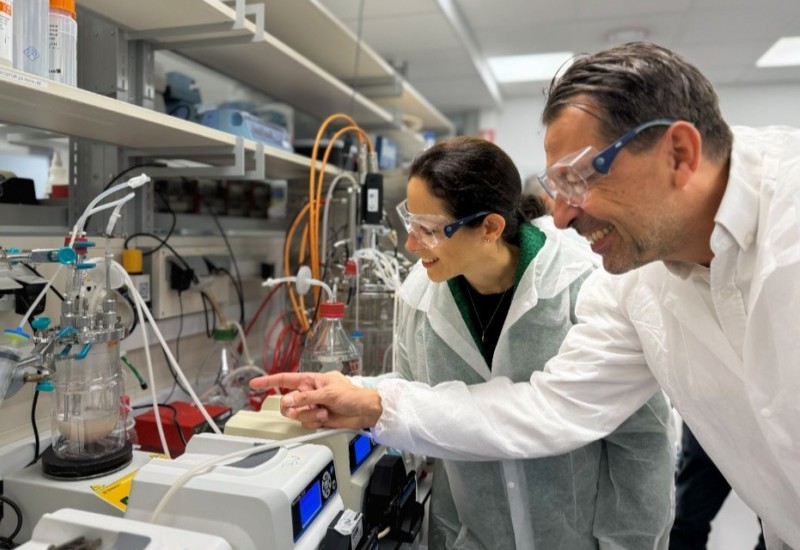Feature article - Growth in Gujarat
Anupam Rasayan has made a splash in the news with its recent IPO and a major new deal. We spoke with some of the senior executives
The first half of 2021 has seen some major developments in the 44-year history of Indian speciality chemicals company Anupam Rasayan. The company launched an IPO and subsequently announced a major new contract with an unnamed multinational customer.
The IPO on the Mumbai Stock Exchange, which closed in March, raised about $100 million on top of $30 million) that the company had already raised from its existing investors. Despite a relatively high price-earnings ratio, it was well received by the market.
This reflected both strong investor interest in life sciences and speciality chemicals in general, and Anupam’s track record of growth. In the last three fiscal years, says CFO Afzal Malkani (pictured), it has achieved average CAGRs of 34% in revenues, 40% in EBITDA and 20% in net profits, sustaining “no significant impact” from the effects of the COVID-19 pandemic.
Of the new influx of capital, Malkani adds, about 70% will be used to pay down high-interest debt and $65 million has already been used this way. Most of the rest is going toward general corporate purposes, such as working capital and cost reduction measures, like reducing dependence on non-renewable sources of energy.
Notably, $6 million will be spent to install solar panels, which will save about $1.5 million/year over the next 25 years. The company is also investing in converting by-product waste back to raw materials, acquiring new tankers to reduce logistical costs.
Next, in April, Anupam signed a letter of intent to supply multiple kinds of life science-related chemicals in two orders that will last five years. For the first, covering three products worth about $150 million, it is spending about $9.5 million on debottlenecking measures. For the second, worth about $73 million, no investment was needed as it can supply the product with only minor process modifications.
This was certainly a significant order but, notes head of sales Ravi Desai, it is something that Anupam has been doing for many years at this kind of scale. The real novelty is that, because it is now partly in public ownership, it has to announce developments like this.
Forty years on
Anupam itself was established in 1977 and began business as a partnership firm in 1984. It is now a globally active custom manufacturer of active ingredients, advanced intermediates, and speciality and fine chemicals. Although, like most CMOs, it sells a few of its ‘own products’, it is very much focused on custom manufacturing.
The firm’s customers include many multinationals in Europe the US, Japan and China, with others in Taiwan, Australia and South Africa. Syngenta, UPL and Sumitomo Chemical are known to be among them. For most of them, says Desai says, it is a single-source supplier.
Anupam is ISO 9001-, 14001- and 18000- accredited for quality and environmental management systems and has been recognised as a ‘star export house’ by the Indian government. Its stated objective is “to be a leading player in the specialty chemical industry and service our customers’ demands”, with a vision of being “globally reputed with respect to research, technology, quality, safety and ethical values”.
Anupam divides its markets in two. Life Sciences, comprising active ingredients and intermediates for pharmaceuticals, crop protection and personal care, supplied on a product-specific basis, accounts for about 90% of sales and drives most of its growth. Polymers, comprising intermediates for polyamides and high performance resins for applications including aviation and defence, make up the rest.
The company has four large sites at Sachin, near Surat, and two in Jhaghadia, all in the southern part of Gujarat state. These are all are designed around specific chemistries and there are also two R&D centres at Sachin. The newest manufacturing sites are:
* Site IV at Sachin, a multi-purpose fluorination site
* Site I at Jhagadia, a multi-purpose halogenation site; and
* Site II at Jhagadia
“When we speak of our capabilities, we speak of three things: our employee strength, which is key to the company; our engineering strength; and thirdly, chemistry and engineering capabilities,” Desai says.
Anupam employs 1,800 people, including 55 in R&D, eight in process optimisation and six in process safety. Unusually in India, where employee retention is often a major challenge, it can cite examples of people at all levels who have stayed for decades, thus keeping knowledge in-house.
“In simple terms, any person who works for you is looking for three things: respect, the opportunity for knowledge enhancement and good remuneration,” says Desai. “If you give them all of these things, then no-one will want to leave. This is one of our key strengths.”
In terms of chemistry, he adds, Anupam bases its approach on six pillars:
1. Environment, health and safety, with a target-driven approach and a focus on continuous improvement
2. Quality, including consistency of supply
3. Technical focus on innovation and new process development, including new production technologies and continuous manufacturing processes: the company has invested a lot in this area in recent years, moving over a large number of speciality and fine chemical products over to continuous
4. A competitive and sustainable business model, based on both cost-competitiveness and best-in-class service standards
5. Being a reliable and responsible supplier, with a customer-centric approach and logistical capabilities in its key export markets
6. Transparency and strict IP protection
Technical focus
The list of chemistries Anupam carries out is lengthy, but the key ones, says Malkani, are diazotisation, hydrogenation, fluorination, bromination, chlorination, continuous chlorination, nitration and halogen exchange. The vast majority of the products it makes involve multi-step synthesis and multiple chemistries. The company says that it puts a lot of emphasis on process safety.
“The idea here is that if you are able to measure everything, then you can benefit,” Desai says. “First, measure what can go wrong, then mitigate it. It is our responsibility to make processes safer.”
Notably, as key parts of a wider analytical infrastructure, Anupam carries out reaction calorimetry and differential scanning calorimetry, using instruments from Mettler Toledo. It is one of the first Asian chemical companies with these capabilities. These are used to carry out Hazop tests during the R&D and pilot stages before a new product enters the plant in order to:
* Identify process hazards and their routes *
Mitigate hazard through process improvement and engineering controls
* Develop safe operating procedures; and,
* Train employees
Another key area of focus for Anupam has been environmental mitigation measures at its sites, notably in:
* Upgrading its air pollution control systems
* A liquid multiple effect evaporation system to recover high TDS-bearing effluent and recycle distillate for use
* Liquid effluent treatment by chemical, catalytic and ozonation means
* Waste minimisation via new chemical technologies and distillation solvent extraction systems; and
* Gas control by using exotic materials to eliminate leakages and corrosion and heat exchangers with primary and secondary systems for cooling water and chilled water and brine circulation
Contact
Ravish Chaudhary
Anupam Rayasan
www.anupamrasayan.com















